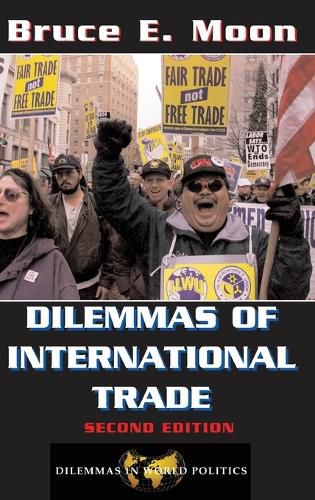Readings Newsletter
Become a Readings Member to make your shopping experience even easier.
Sign in or sign up for free!
You’re not far away from qualifying for FREE standard shipping within Australia
You’ve qualified for FREE standard shipping within Australia
The cart is loading…






In the post-Cold War world, trade is the new arena for competition-between nations, between groups, between ethical and theoretical ideas. In this revised and updated second edition of Dilemmas of International Trade political economist Bruce Moon puts contemporary trade events–NAFTA, United States-Japan controversies, the Uruguay Round of GATT, China’s Most Favored Nation status, the founding of the World Trade Organization–into historical and theoretical perspective with the British Corn Laws, the Great Depression, the Bretton Woods system, and the origins of the European Union. Economic theory, terms, and concepts are clearly explained and contextualized with those from international relations.Throughout the book, three central dilemmas are examined: the unequal distribution of income and wealth created by international trade, the tradeoff among competing values that trade requires, and the difficult interrelationship between economic and foreign policy goals within and among trading nations. Though internationally framed, each dilemma has ramifications at a variety of levels all the way down to the individual’s role in the global economy-as a consumer, as a citizen, and ultimately as a moral agent.
$9.00 standard shipping within Australia
FREE standard shipping within Australia for orders over $100.00
Express & International shipping calculated at checkout
In the post-Cold War world, trade is the new arena for competition-between nations, between groups, between ethical and theoretical ideas. In this revised and updated second edition of Dilemmas of International Trade political economist Bruce Moon puts contemporary trade events–NAFTA, United States-Japan controversies, the Uruguay Round of GATT, China’s Most Favored Nation status, the founding of the World Trade Organization–into historical and theoretical perspective with the British Corn Laws, the Great Depression, the Bretton Woods system, and the origins of the European Union. Economic theory, terms, and concepts are clearly explained and contextualized with those from international relations.Throughout the book, three central dilemmas are examined: the unequal distribution of income and wealth created by international trade, the tradeoff among competing values that trade requires, and the difficult interrelationship between economic and foreign policy goals within and among trading nations. Though internationally framed, each dilemma has ramifications at a variety of levels all the way down to the individual’s role in the global economy-as a consumer, as a citizen, and ultimately as a moral agent.